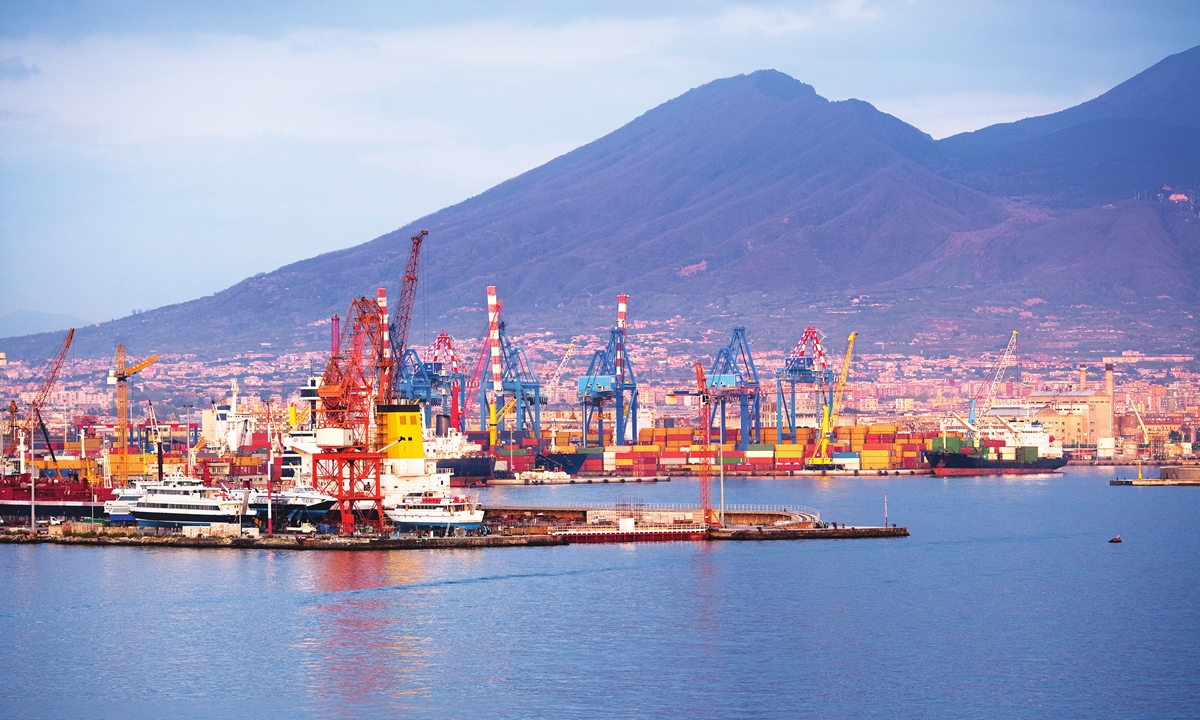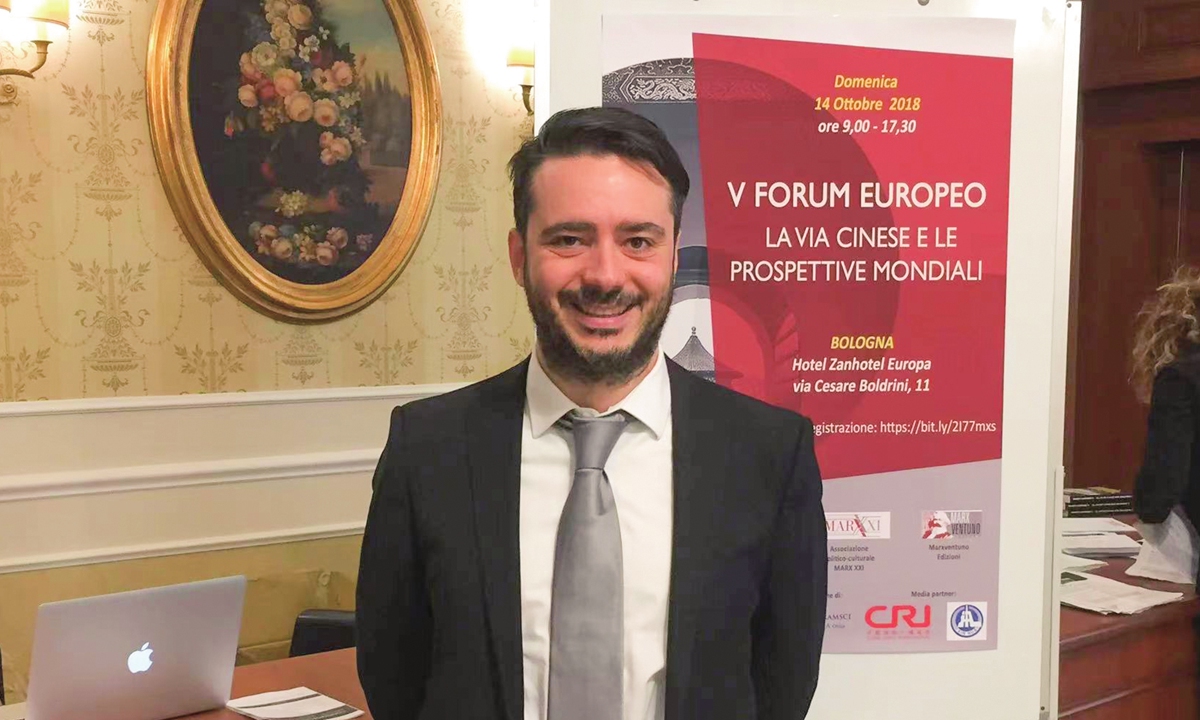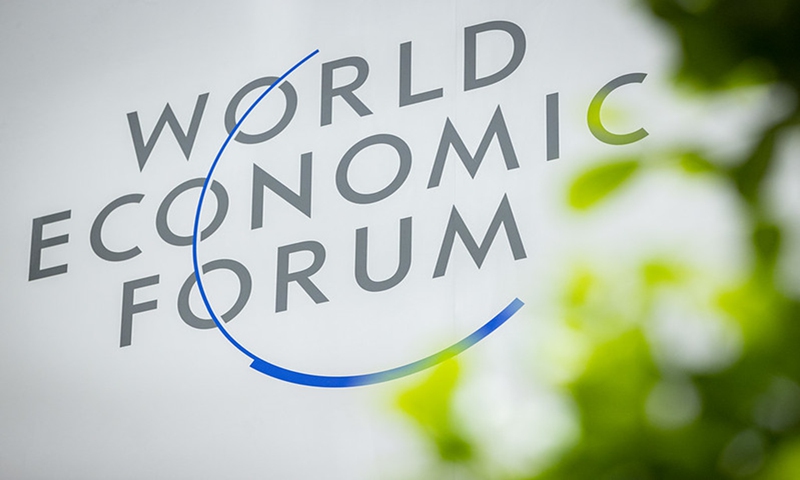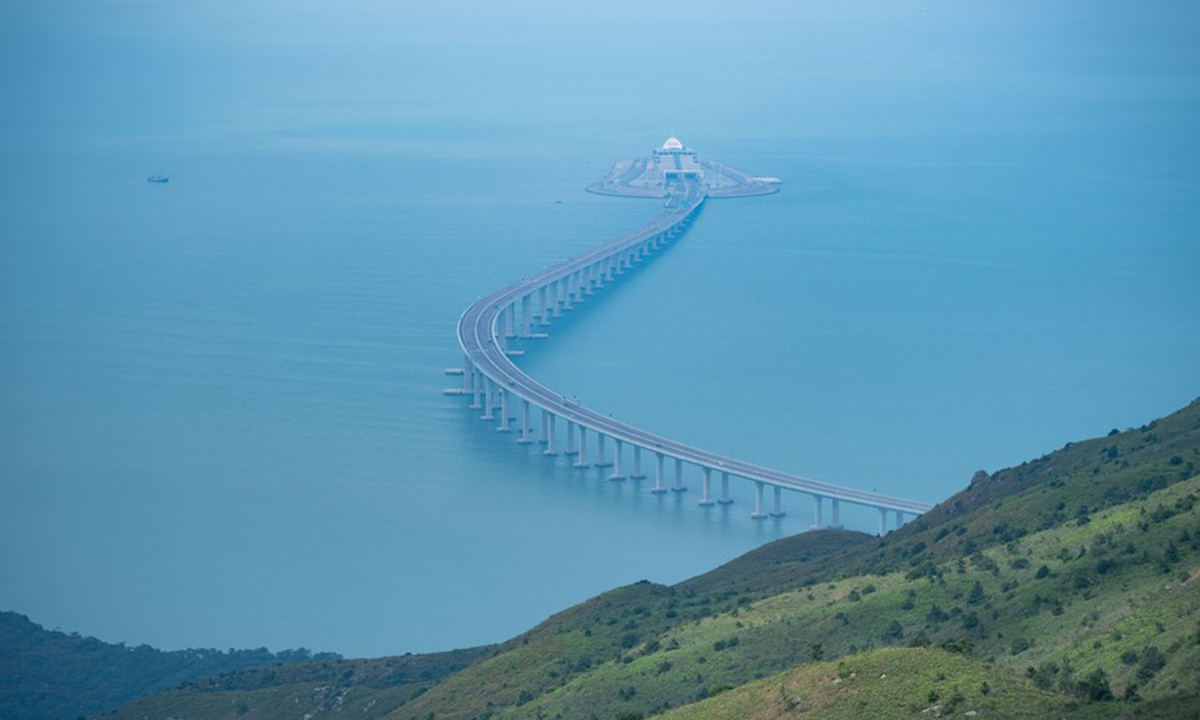
A view of Naples, Italy. Photo: VCG
Editor's Note:This year marks the 10th anniversary of the Belt and Road Initiative (BRI) proposed by Chinese President Xi Jinping. Through the lens of foreign pundits, we take a look at 10 years of the BRI - how it achieves win-win cooperation between China and countries along the Belt and Road and how it increases people's sense of fulfillment in these countries.
In a recent interview with Global Times (GT) reporter Xia Wenxin, Francesco Maringiò (Maringiò), an Italian China expert and president of the New Silk Road Promotion Association of Italy, shared his views on the significance of the BRI, Italy's role in the initiative and concerns about his country's possible withdrawal.
This is the third article of the series.
GT: How do you assess the impact and results of the BRI in Italy since the country joined? Which aspects or projects of the BRI interest Italy the most?
Maringiò: I prefer to focus on the potentiality of the impact of the BRI in Italy. Italy's potential to play a pivotal role in the BRI is very high. Since Italy is located in the middle of the Mediterranean Sea, and of course, the north of the country is interconnected with Central and Northern Europe, it could be a perfect hub for communication and trade, particularly for connecting the south - I mean the MENA [Middle East and North Africa] region - and Northern Europe and for interconnecting the shipping with rail and freight routes. That's the potential role that Italy can play, according to the logistic point of view in the framework of the BRI.
Other than that, I believe that when Italy thinks about its role in the BRI, my country also has an important and pivotal role in the global production value chain. I mean, Italy and China can cooperate more so that some of the products can be mainly created and produced in China, and then the finishing part could be done in Italy. It will attach great value to the product that can be exported to Europe and the world.
And not only that, Italy is the second biggest manufacturing country in Europe. Then this point can be matched with projects from China, an important country leading manufacturing in many areas. So the BRI could be the framework and the line that connects the two important manufacturers - the biggest in Asia and the second biggest in Europe.
In general, this means that Italy not only focuses on logistics and acts as a final part of the value chain, for example, in some industries like fashion or others, but also plays a more significant role in some industrial sectors and the very manufacturing process. So, these three points, I think, are the pillars that give Italy-China cooperation an important role in the BRI framework.
Also, with these three pillars, we can develop a strategy to help Italy overcome some difficulties in some industrial sectors. From this perspective, Italy should not only think about how to seize these opportunities, but also imagine how they can be developed over time. It should use this cooperation to get stronger economically and create new opportunities with China and other countries involved in the BRI. So in this way, we need to think about our participation in the BRI as an opportunity that we can use to improve ourselves.
GT: As an initiative that connects Europe and Asia, what role does the BRI play in promoting the integration of Eurasia?
Maringiò: Integration is a very hot topic in Europe now. That's because, with the clash around the Ukraine crisis, the integration process seems to be frozen. But we know that a peaceful environment is essential to the BRI. So since Italy and all Europe are really affected by the consequences of the war, we should attach more importance to interconnecting and integrating the Eurasian continent. In this way, we can find the proper source from diplomatic and economic fields and any point of view to give the Ukraine crisis a peaceful solution. That's our primary goal at this time.
Besides, the BRI can help rebuild infrastructure, make trade flourish again, and find financial and economic support for reconstruction - all these are what we need to bear in mind. Otherwise, this situation will negatively affect the people involved and whole Europe. And it will increase the division between the European and Asian parts of the Eurasian continent.

Francesco Maringiò Photo: Courtesy of Maringiò
GT: What are the difficulties in promoting the BRI in Italy and Europe? How can these difficulties be solved?
Maringiò: I think the difficulties were enhanced by two exogenous effects. The first was the US' decision to increase tensions with China and pushing European and NATO partners to follow this path. The other exogenous problem was the occurrence of COVID-19, which was quite solved everywhere so that now we can focus on the path to increase connection and relations.
Regarding the first point, I think we need to abandon the Cold War mentality because time is totally changed from the Cold War period, and focus on our interests instead. The only way to solve this point is to de-politicize many issues, straight follow our common interests and values, and focus on concrete projects and needs. Otherwise, increasing these sovereign structures in the ideological aspect and politicization will create more and more problems.
GT: The West has long questioned the political motives behind the BRI, accusing it of "dividing Europe," for instance. What do you think of such accusations?
Maringiò: I don't agree with this evaluation because the BRI project is not dividing European countries. Some countries became members of the BRI, and others are not but are involved in the concrete projects of the BRI. So each country is choosing its way to be part of this project. In reality, there is no policy or goal to promote divisions in the BRI. And the BRI project itself cannot develop with division in Europe. What is dividing the countries is, what some scholars call, the so-called collective West against the Global South. This decision to divide the world into areas and one against the other creates divisions and affects the concrete possibility of close cooperation, not the BRI.
GT: In 2019, Italy was the first G7 country to join the BRI. But the current administration claims that it is considering withdrawing from the BRI, saying the decision will not affect the development of good relations with China. Why are there voices to support quitting the BRI in Italy? How likely is it that Italy will withdraw from the initiative?
Maringiò: That's a very complicated point because there are a lot of articles in the Western media, namely the Italian and European ones talking about the decision of our government to withdraw from the BRI and from the memorandum of understanding signed in March 2019. And most of these analyses stressed that the decision was to accomplish a request by the US. And also, they stressed that it's good for Italy since the signing of the memorandum has no concrete effect.
I don't agree with these analyses. First, I'd like to quote just one significant piece of data: Italian exports to China increased by 42 percent from 2019 to 2021. At the same time, the increase in Italian exports to the US was around 16 percent. That means that the US may not be interested in importing from Italy as much as China does, but it continues to have good trade relations with Italy. So probably, these articles exaggerated the pressure from the US. In any way, a government should follow a path according to national interests and not a foreign country's interests.
Being a part of the BRI is not against Italy's interests. Apart from Italy, many countries in this initiative are members of the European Union, most are in NATO. If the BRI is not a problem for them, why should it be a problem for Italy? So I think, again, that is a part of the campaign for criticizing relations of countries and trying to describe the international situation as a clash between areas or different values. This is absolutely an artificial problem.
Another aspect I would like to stress is that according to my personal and modest view, what is lacking in Italy is a very detailed and specific Italian strategy for the BRI.
After the signing of the memorandum, the exogenous problems that we have discussed before, like US pressure and COVID-19, and some endogenous problems, like the change of governments, have created confusion about the Italian strategy.
In my view, the best way to make good and better relations for cooperation between Italy and China and to catch the tide of the BRI is to fix a clear strategy based on our views. The BRI is an opportunity, so it's important for us to show our strategy. Otherwise, we risk losing an opportunity. Now we need to figure out what is important for our domestic interest, for Italy-China cooperation, for the logistic aspect, and for industrial cooperation. That's the strategy that should be made clear.
According to media reports, the Italian government has already decided that the country will quit the BRI. But I'm confident that the government will think carefully about it and will not follow a path that is absolutely useless in terms of friendship with other European or NATO friends and will totally cause troubles with China and other member countries of the BRI project. It would be very wild and nonsensical to follow this path.
My modest contribution and idea is to suggest the government think carefully about it because we are talking about the future of our country. It is not a political joke. And I want to ask the government to express its strategy if it is really thinking of withdrawing from the memorandum because if we do so without a strategy, it will be a disaster for the country from every point of view.



